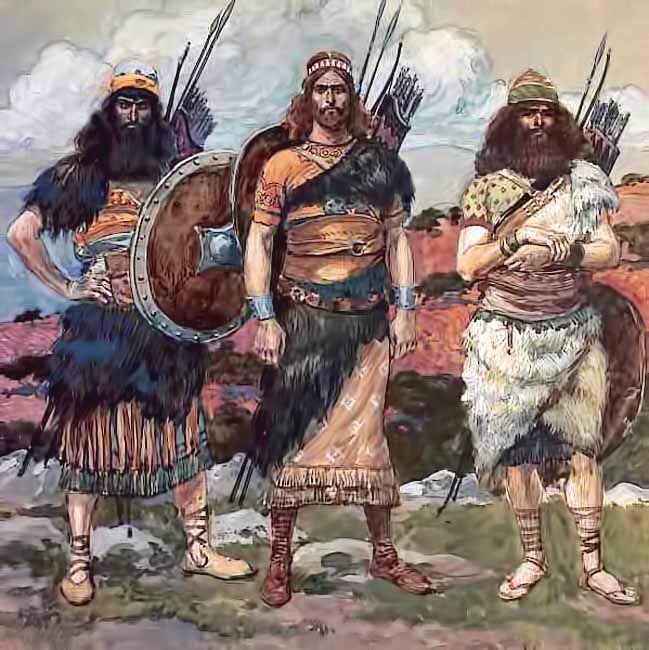The Sons of Issachar and the Task of the Christian Artist
This week begins a series of posts devoted to applying the Biblical model of the Sons of Issachar to the task of today’s Christian artists. The First Book of Chronicles, in its 12th chapter, lists the groups of warriors who came to support David the Psalmist while he was living at Ziklag in order to escape King Saul’s wicked persecution of him. These soldiers recognized that Israel was to be given to David by the Will of God (v 23), and pledged themselves and their abilities to David to help accomplish that end. This passage lists not only these men, but also notes their talents. Verse 32 reads, “Men of Issachar, who understood the times and knew what Israel should do” (NIV). I believe that these Sons of Issachar displayed a vital ability that today’s Christians (especially those who are artists) need desperately to recover. What precisely, the reader may ask, is this ability? What does it mean to “understand the times and know what Israel should do?”
The knowledge of what Israel, God’s people, should do, can be based on one thing only. Holy Scripture, which, as the Light of our path (Ps 119:105) and the Way to Life (Prov 6:23), is the Church’s only Infallible Guide and Standard for faith and duty (Prov 29:18; Isa 8:20; Gal 1:8; 1 Thess 2:13; 2 Tim 3:16-17, etc.) The Bible speaks to the entire spectrum of human existence, providing for mankind guidance and illumination for every situation ever to be faced by our race. The Word of God in the Divinely-Inspired Body of written Truth that reveals the Knowledge of the Triune God, His Creation, and His Saving Acts on behalf of His People. This Body of Knowledge is the Basis of theology (“the knowledge of God” in Greek), and all Christians should strive to learn and understand Scripture so that they may have an ever-increasing Knowledge of God (theology) to inform and shape every aspect of our lives and actions, so that we might know what God would have us do in every circumstance we pass into. The importance of theology for the artist is obvious: It provides the Biblical “Way of seeing” that gives the artist the content or subject-matter of his art, as well as influencing the form of his art, as the artist learns how the various art-forms in Scripture are used by God and His Church to communicate knowledge of Him to different (and all) cultures (study of this is to form the focus of this post, Lord willing, in weeks to come.).
The Sons of Issachar knew the Bible and Its Commands and Precepts (and so should we). But what, then, does it mean “to understand the times?” This means that the Sons of Issachar knew the meaning of the historical situation that Israel found herself in. They understood the history (the origins, development of culture, sociology, etc.) of Israel and the nations surrounding her, as well as the interchanges and relationships of Israel within herself and with the nations round about. They knew the temper and mood of their people and culture. They had obviously put serious effort into studying their nation’s history and cultural development. This type of knowledge is just as important for Christians today as it was in David’s time. If we as artists fail to understand our history and cultural development, it will hamper the effective fulfillment of our artistic calling greatly. Only as we understand these areas will we know how to effectively communicate the timeless Truth of Christ in such a way that the culture of our own time will understand and be engaged by it. Only an understanding of our culture’s place in history (how it developed into the cultural nexus it is, and what it is developing toward will clue us in as to the forms of art that will most readily be received today by the people around us, and as to what the most pressing needs of our contemporary society are, such as the current abortion holocaust crisis, and the breakdown of the concepts of absolute right and wrong, etc.).
Both types of knowledge (the historical and the theological) were necessary to the Sons of Issachar’s ability to discern the times, and both are necessary to us today if we as Christian artists are to be any help to the Church’s mission to fulfill her Great Commission (Matt 28:18-20). Issachar’s Sons were only able to interpret their time because of their knowledge of the Key to the Parable of history, the Bible. However, if they had not intimately known their history and cultural development, they wouldn’t have been able to apply Scriptural Revelation to it, and thus their Scriptural knowledge, while good, would have been useless to God’s People in a practical (or applied) sense. Both kinds of knowledge together are what allowed the Sons of Issachar to help fulfill God’s Will in their own lives, and in the life of their nation.
This is no less true for us today. If we are to speak effectively as artists (or as Christians of any other calling) to what the Church and our culture are to do, we must emulate our ancient brothers in the Faith, and seek to understand the times through the lens of Scripture. We’ll begin to examine the implications of understanding the times for artists next week (God willing).
